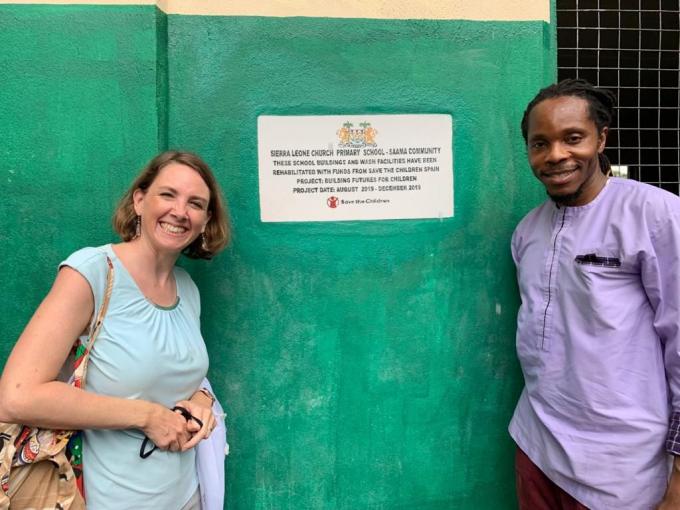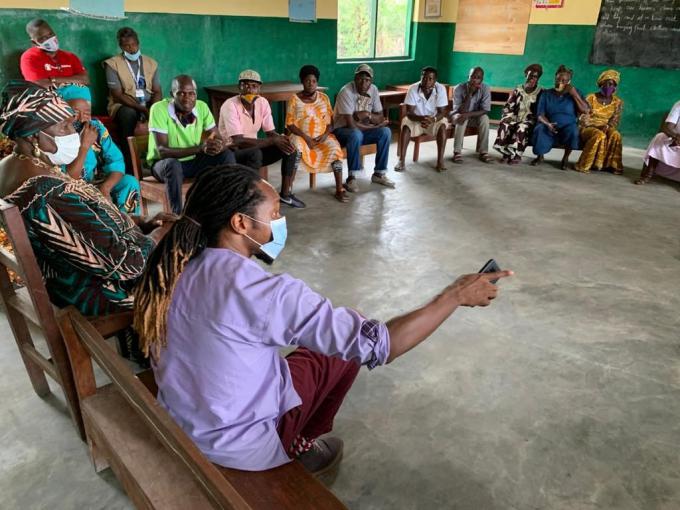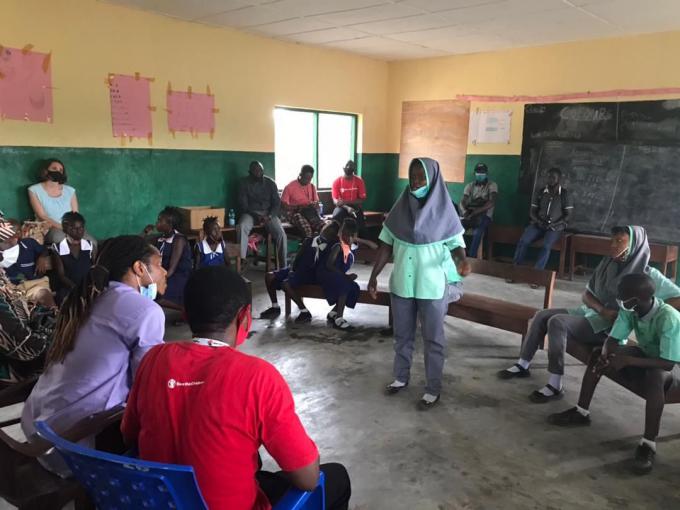Minister’s visit to schools in riverine communities proves they are No longer “hard to reach” for quality education

Heather Marie campbell, Country Director of Save the Children with Minister of Basic Senior Secondary Education, Dr Moina David Sengeh in front of a plaque of the newly constructed school in Saama riverine community, March, 2021: Photo credit, Mary Sannoh, Save the Children.
On Thursday, 11 March, 2021, The Minister of Basic and Senior Secondary Education, Dr Moina David Sengeh and Country Director for Save the Children, Heather Marie Campbell, Launched 18 rehabilitated and constructed Schools in Saama riverine community; over two hours away from Pujehun town. Among the high-level delegation were the District Director for Education, Teaching Service Commission, and Paramount Chief and Champion for children, Madam Matilda Minah.
During the launch, Dr Sengeh met with pupils, teachers and school management committee members to talk about the challenges they faced and how the new schools have impacted learning in riverine communities. He also heard from leaders including Paramount Chief Madam Matilda Minah and town chief Gbessay Kamara who spoke of the value of his visit to children and community members.
“For decades it is only in the history of Save the Children that we have seen the Minister of Education in the riverine community, often known as a “hard to reach” said PC Minah. They affirmed that most service providers preferred working with them remotely because they were afraid of travelling by boat.

Dr David Sengeh and Paramount Chief Madam Minah talk to teachers and school management committee members about access to education, March 2021. Photo credit: Ibrahim Conteh, Save the Children
The Education project in Pujehun
Save the Children has been supporting education in the most remote communities since 2010 in response to education needs of children in riverine communities. Research in 2013 showed that around 25% of children in these communities were out of school with over 41 percent of 15-24-year olds not completing primary education. Girls were particularly affected and at higher risk of drop out due to early marriage and teenage pregnancy, challenges in the classroom and lack of parental support.
To address these challenges, Save the Children focused on remote communities and used a holistic design to increase the quality of learning in a safe learning environment. Girls and boys are supported to complete primary education, accelerated education is offered to disadvantaged children and young mothers to transition back to formal education, up to 200 teachers supported with professional development to improve quality of learning and; capacity building given to local authorities and communities to effectively manage schools.
The result
· There has been 67% increase in student enrolment across communities with 57% girls enrolling across the schools we support;
· Accelerated Education Programme (AEP) centres have supported 720 out of school children continue learning with 69% transitioning to junior secondary school;
· National Primary School Examination rates increased from 54% in 2019 to 91% in 2020.
In his reflection on the visit and assessment of access to education in remote communities, Dr Sengeh recognized the great work done by Save the Children in providing access to quality education for vulnerable and “the most hard to reach” communities with renewed commitment to do more for all children to attain free quality ‘inclusive’ education.
“For me, it’s very important to see first-hand the challenges people are facing; the teachers, the students. Saama community is one of the most remote places in Sierra Leone. We travelled miles by car, foot, even took a boat on a journey lasting over two hours. We want these teachers and students to know that we have not forgotten them. We see them and we will continue to listen and provide support.”

Pupil of Saama primary school tells the Minister what it means to have a school in their community, March 2021. Photo credit: Ibrahim Conteh, Save the Children
The visit was timely. It has given MBSSE an opportunity to get first-hand experience of what it means to have access to education and a better understanding of what it means to reach every child, at the last mile, to ensure that even riverine communities are no longer hard to reach.
 Sierra Leone
Sierra Leone